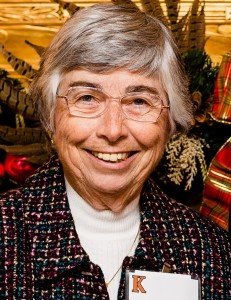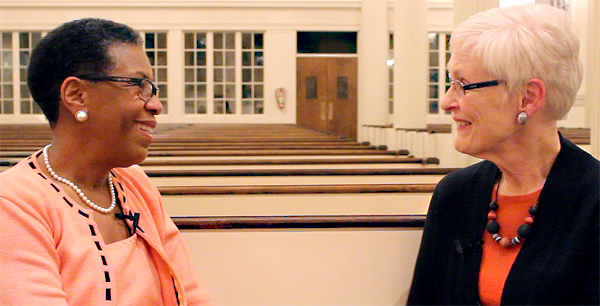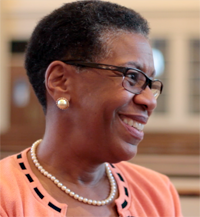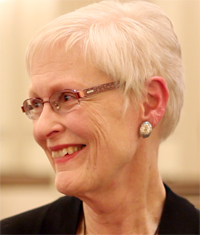 Kalamazoo College faculty members not only teach, also advise students, and serve on numerous committees that help direct the College’s academic programs, they publish books, essays, scientific papers, and other writings, and they receive awards, grants, and countless other accolades. Below are recent achievements by just a few K faculty members. Well done, professors!
Kalamazoo College faculty members not only teach, also advise students, and serve on numerous committees that help direct the College’s academic programs, they publish books, essays, scientific papers, and other writings, and they receive awards, grants, and countless other accolades. Below are recent achievements by just a few K faculty members. Well done, professors!
(By the way, K has a very low (13-1) student-to-faculty ratio. Of the nearly 100 full-time “resident” faculty, 96 percent hold a Ph.D. or equivalent terminal degree.
Bob Batsell, professor of psychology, received a 2014-2015 Scholarship of Teaching and Learning grant, from K’s Teaching and Learning Committee, for his project “Test Enhanced Learning in the Psychology Classroom.”
Jeff Bartz, professor of chemistry, received a $220,000 grant from the National Science Foundation for his project entitled “Photodissociation Dynamics Studied by Velocity-Mapping Ion Imaging.”
Lisa Brock, academic director of the Arcus Center for Social Justice Leadership and associate professor of history, co-edited a special issue of the Radical History Review on the global antiapartheid movement.
Henry Cohen, emeritus professor of romance languages and literature, published the article “The river, the levee, love and confession: The thematic of Grazia Deledda’s L’argine” in Forum Italicum.
Kiran Cunningham, professor of anthropology, received a 2014-15 Scholarship of Teaching and Learning grant from K’s Teaching and Learning Committee, for her project “An Assessment of Transformative Learning through Change-Oriented Research.”
John Dugas, professor of political science and Arcus Center for Social Justice Leadership associate, published two book chapters. “Old Wine in New Wineskins: Incorporating the ‘Ungoverned Spaces’ Concept into Plan Columbia,” appeared in U.S. National Security Concerns in Latin America and the Caribbean: The Concept of Ungoverned Spaces and Failed States. “Colombia” appeared in Politics of Latin America.
Peter Erdi, Luce professor of complex systems studies, co-authored Stochastic Chemical Kinetics, a book published by Springer.
Dennis Frost, Wen Chao Chen associate professor of East Asian social sciences, published “Sporting Disability: Official Representations of the Disabled Body at Tokyo’s 1964 Paralympics” in the Asia Pacific Journal of Sport and Social Science. He also received a 2014-15 scholarship of teaching and learning grant from K’s Teaching and Learning Committee for his project “Acquiring the Gift of Gab: Demystifying Public Speaking.”
Laura Furge, Roger F. and Harriet G. Varney professor of chemistry, published two papers with student co-authors: “Mechanism-based Inactivation of Human Cytochrome p450 3A4 by Two Piperazine containing Compounds” appeared in Drug Metabolism and Disposition; “Molecular Dynamics of CYP2D6 Polymorphisms in the Absence and Presence of a Mechanism-based Inactivator Reveals Changes in Local Flexibility and Substrate Access Channels” appeared in PLoS One. Also, her article “Biochemistry and Molecular Biology Education” was published in Social Ecology of the Classroom: Issues of Inclusivity.
Adriana Garriga-Lopez, assistant professor of anthropology and Arcus Center for Social Justice Leadership associate, published “Azucar dura y melaza vaga” in the online journal 80grados.
Menelik Geremew is the new Stephen B. Monroe assistant professor of money and banking, a chair held by the faculty member within the Department of Economics and Business who teaches in the field of money and banking. Charles J. Monroe established this chair in 1966 in honor of his father, Stephen B. Monroe.
Christine Hahn, assistant professor of art and art history, has begun a three-year term on the College Art Association’s (CAA) Committee on Diversity Practices, one of CAA’s nine Professional Interests, Practices, and Standards Committees. Her committee supports the development of global perspectives on art and visual culture; promotes artistic, curatorial, scholarly, and institutional practices; and assesses and evaluates the development and implementation of curricular innovation, new research methods, curatorial and pedagogical strategies, and hiring practices that contribute to the realization of these goals. The Committee is committed to organizing conference sessions that address issues concerning race and ethnicity.
Autumn Hostetter, associate professor of psychology, had three articles published recently. “Gesture-speech integration in children with specific language impairment” appeared in the International Journal of Language and Communication Disorders; “Gesutre in Reasoning: An Embodied Perspective” appeared in The Routledge Handbook of Embodied Cognition; and “Action Attenuates the Effect of Visibility on Gesture Rates” appeared in the journal Cognitive Science. She also received a 2014-15 Scholarship of Teaching and Learning grant from K’s Teaching and Learning Committee for her project “Test Enhanced Learning in the Psychology Classroom.”
Patrik Hultberg, associate professor of economics, received a 2014-15 Scholarship of Teaching and Learning grant from K’s Teaching and Learning Committee for his project “Assessing the Flipped Classroom.”
Andrew Koehler, associate professor of music and director of the Kalamazoo Philharmonic won the American Prize in Orchestral Programming – Community Division.
Maksim Kokushkin, assistant professor of sociology published “Standpoint Theory is Dead, Long Live Standpoint Theory! Why Standpoint Thinking Should Be Embraced by Scholars Who Do Not Identify as Feminists?” in the Journal of Arts and Humanities.
Amy Lane, visiting assistant professor of sociology, received a 2014-15 Scholarship of Teaching and Learning grant from K’s Teaching and Learning Committee for her project “An Assessment of Transformative Learning through Change-Oriented Research.”
Charlene Boyer Lewis, professor of history, was selected into the Organization of American Historians Distinguished Lectureship Program.
Sarah Lindley, associate professor of art, had an exhibition at the Lansing Art Gallery titled “Of Consequences: Industry & Surrounds.” She also received a Great Lakes Colleges Association (GLCA) Expanding Collaboration Initiative titled “Surrounding Industry and Environs: An Intellectual Resource Collective.”
Amy MacMillan, L. Lee Stryker assistant professor of business management and her co-authors received the award for best conference refereed paper from the Marketing Management Association for their paper “Improving the Collaborative Online Student Evaluation Process.”
Simona Moti, assistant professor of German, had her essay “Between Political Engagement and Political Unconscious: Hugo von Hofmannsthal and the Slavic East” published as a chapter in the edited volume of German Literature as World Literature.
Andy Mozina, professor of English, published Quality Snacks, a book of 15 short fiction stories.
Stacy Nowicki, Title IX coordinator and library director, was appointed by Michigan Governor Rick Snyder to the Library of Michigan Board of Trustees.
Jennifer Perry, visiting assistant professor of psychology, received a 2014-15 Scholarship of Teaching and Learning grant from K’s Teaching and Learning Committee for her project “Test Enhanced Learning in the Psychology Classroom.”
Taylor Petrey, Lucinda Hinsdale Stone assistant professor of religion, published his article “Semen Stains: Seminal Procreation and the Patrilineal Genealogy of Salvation in Tertullian” in the Journal of Early Christian Studies.
Di Seuss, writer in residence and assistant professor of English, received residency at Hedgebrook, a writing retreat for women writers on Whidbey Island, Wash. Her essay/prose poem was published in Brevity and several of her poems have been selected to be published in the Missouri Review. Her piece “Wal-Mart Parking Lot” received the “½ K Prize” from the Indiana Review and her piece “Free Beer” was selected to be included in Best American Poetry 2014. Di is now in a tenure track position at K.
Mike Sosulski, associate provost and chair and associate professor of German, won 2014’s Best Article Award from the journal Die Unterrichtspraxis/Teaching German with his article “From Broadway to Berlin: Transformative Learning through German Hip-Hop.”
Noriko Sugimori, assistant professor of Japanese, received a grant from the GLCA Expanding Collaboration Initiative for the project “Bringing East Asia to the Great Lakes Region: An Intergenerational Cross-Cultural Digital Oral History Project.”
Amanda Wollenberg, assistant professor of biology, was a recipient of a 2014-15 Scholarship of Teaching and Learning Grant, from K’s Teaching and Learning Committee for her project “Assessment of Student Experiences in the Cell and Molecular Biology Lab.”.
Margaret Wiedenhoeft, associate director for the Center of International Programs, was selected as one of three co-editors of the forthcoming 4th Edition of NAFSA’s Guide to Education Abroad for Administrators and Advisors.
Michael Wollenberg, assistant Professor of biology, co-authored “Propioniobacterium-Produced Coproporphyrin III Induces Staphylococcus aureus Aggregation and Biofirm Formation.” a paper titled in mBio.
[Malllory Zink ’15, helped compile this list. Thanks, Mallory!]
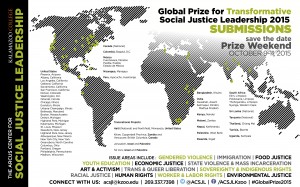 Kalamazoo College has received 87 entries from 22 countries to its 2015 Global Prize for Transformative Social Justice Leadership. Entry deadline for the juried competition was April 17. Ten finalists will be announced in early July and vie for a $25,000 prize during a Global Social Justice Leadership Exchange, Oct. 9-11, on the K campus in Kalamazoo, Michigan.
Kalamazoo College has received 87 entries from 22 countries to its 2015 Global Prize for Transformative Social Justice Leadership. Entry deadline for the juried competition was April 17. Ten finalists will be announced in early July and vie for a $25,000 prize during a Global Social Justice Leadership Exchange, Oct. 9-11, on the K campus in Kalamazoo, Michigan.

